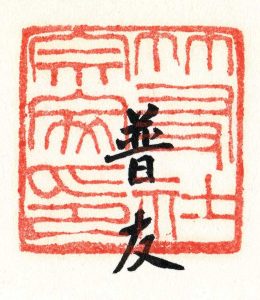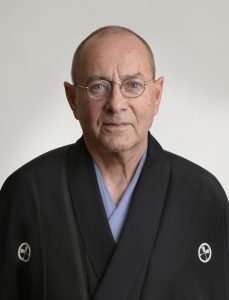
Profil »
Concerts »
Discografie »
List of Publications»
Profile
Students who received “Shihan Menjô” from Zenkoku Chikuyusha, Tokyo
Ueli Fuyûru Derendinger, 1996
Jürg Fuyûzui Zurmühle, 1996
Andrea Fuyûan Hofer, 2002
Wolfgang Fuyûgen Hessler, 2002
Ursula Fuyûmi Schmidiger, 2010
1940
Born 1940 in Germany.
Schools in Basel, Switzerland.
1968 – 1974
Studied Musicology and Ethnomusicology at the Universities of Berlin, Germany and Wesleyan University, USA.
1970
Began to study Shakuhachi with Araki Kodô V at Wesleyan University in 1970.
1971
Continued his studies of Shakuhachi with Kawase Junsuke III, first at Wesleyan University later in Tokyo, Japan.
1974
Recieved PhD from Wesleyan University with a thesis on history and music of the Shakuhachi.
1976
Recieved Shihan (Master) of the Chikuyûsha of the Kinko-school of Shakuhachi.
1980
Began teaching Shakuhachi at the Academy of Music Basel, Switzerland.
1994 – 2005
Founder and Head of the “Department for Non-Western Music” at the Academy of Music Basel.
Concerts
Austria
Graz
France
Paris (3)
Bourges
Germany
Köln (4)
Berlin (3)
Leipzig (3)
Hamburg (2)
Lübeck (2)
Münster (2)
Essen (2)
München (2)
Bremen
Dresden
Heidelberg
Bielefeld
Schwerin
Düsseldorf
Darmstadt
Güthersloh
Herne
Stuttgart
Kleve
Saarbrücken
Würzburg
Bochum
Weingarten
Great Britain
London (2)
Dartington
Belfast
Italy
Venice (2)
Rome
Torino
Netherlands
Utrecht (3)
Amsterdam
Sweden
Lund (2)
Stockholm
Malmö (2)
Switzerland
Basel (…)
Zurich (4)
Berne (3)
Geneva
Luzern
Winterthur
Interlaken
St. Moritz
Schaffhausen
Ascona
Altstätten
Chur
USA
New York (Asia House)
Participation in Festivals
„steirischer herbst“, Graz 1983
„electonica“, Essen 1990
„Japan in Zürich“ 1993
„Oude Muziek“, Utrecht 1993
„Alt!Neu!“, Leipzig 1994
„nah!fern!“, Leipzig 1996
„Konstellationer“, Malmö 1998
„Metamorphosen“, Lucerne Festival 2000
„Exotik!(?)“ , Leipzig 2000
„Fest der Künste“, St. Moritz 2000
„Take no Oto“, Zurich 2003
„2nd Int. Flute Festival Lund“, 2004
„De Toverfluit“, Utrecht 2006
First Performances
Thomas Kessler „Shakuhachi Control“,
„Irasshaimase“,
Gerald Bennett „Three Dances for the Angel“,
„Kyotaku“, „Yume“, „Three Haiku“
Thüring Bräm „One in Two“
Urban Mäder, „Windstriche“
K.H. Stahmer, „Ima“
Steffen Schleiermacher „Spalt!“
First Performances in Europe
Tôru Takemitsu „Eclipse“
Makoto Shinohara, „Kyûdô B“
Masaaki Hayakawa „Gen’ei“
Tôru Takemitsu „November Steps“
Makoto Moroi „Chikurai Goshô“
Radio
WDR, Cologne
MDR, Leipzig
DRS, Zurich
Discography
1984
Der wahre Geist der Leere (Shin Kyorei et al.), Honkyoku der Kinko Schule, Zürich: Jecklin JD 588-2
1992
“Kyotaku” by Bennett, Gerald, Mainz: Wergo WER 2029-2
1993
Der leere Himmel (Kokû Reibo et al.), Honkyoku der Kinko Schule, Zürich: Jecklin JD 665-2
1994
Music for Two Shakuhachi, from the classical repertoire of the Kinko School, Zürich: Jecklin JD 697-2
1995
The Flute of the Misty Sea (Mukaiji Reibo et al.), Honkyoku of the Kinko School, Zürich: Jecklin JD 699-2
2000
“Andreas Gutzwiller”, Musikszene Schweiz/ Grammont Portrait. Migros Genossenschaftsbund, Zürich: MGB CTS- M 61
List of Publications
1974
Shakuhachi: Aspects of history, practice and teaching. Ph.D. thesis, Wesleyan University. Ann Arbor, Mich: University Microfilms, 195 p
1979
„Hearing with one’s eyes, seeing with one’s ears? Understanding Japanese homonyms“, Journal of Pragmatics 3: 51-58
1979
„Stone Age and Promised Land“, Ethnomusicology XXIII (1): 103-107
1980
„L’instrument extraeuropéen, le compositeur, l’interprète“, in Textes pour l’atelier „Le compositeur et l’instrument“ (IRCAM, Paris): 14-17
1980
„Die japanische Flöte Shakuhachi und ihre Musik“, in 112. Jahresbericht der Musik-Akademie der Stadt Basel: 91-94
1981
„Die japanische Flöte Shakuhachi und ihre Musik“, Tibia VI (2): 335-338
1981
“Das Porträt: Andreas Gutzwiller im Gespräch mit Frank Nagel”, Tibia VI (2): 339-345
1983
Die Shakuhachi der Kinko-Schule. Studien zur traditionellen Musik Japans Vol V, Kassel, Basel, London: Bärenreiter, 265 p, English and Japanese summaries
1983
„Die Ausnahme und die Regel – Shakuhachi und die japanische Musik“, Begleitheft zur 2. Woche aussereuropäischer Musik: Musik-Akademie der Stadt Basel
1983
„The shakuhachi of the Fuke-Sect: Instrument of Zen“, The World of Music XXVI (3): 53-65
1986
„Musik ohne Raum und Zeit“, in Bräm, Thüring ed., Musik und Raum, Basel: GS-Verlag, S.107-110
nd
“The Japanese flute shakuhachi and its music: is it foreign or just strange?“, The Annals of the International Shakuhachi Society vol 1: 7-12
1991
A.G and Bennett, Gerald, „The world of a single sound: basic structures of the music of the Japanese flute shakuhachi“, Musica Asiatica vol 6, Cambridge: Cambridge University Press
1992
“Rhythm in shakuhachi honkyoku”, European Studies in Ethnomusicology, Intercultural Music Studies vol 4, Wilhelmshaven: Florian Noetzel: 269-281
1992
“Learning traditional Music in Japan”, in Schippers, Huib ed.: Teaching World Music, Utrecht: LOKV, 71-78
1992
“Unterrichtsmethoden der trad. japanischen Musik”, in Bräm, Thüring ed., Bewahren und Öffnen, Musikpädagogische Schriften Band 4, Aarau, Musikedition Nepomuk: 95-102
1993
“La polyphonie dans la musique japonaise: Rokudan par exemple”, Cahiers d’ethnomusicologie vol 6, Genève, Ateliers d’ethomusicologie: 11-22
1995
A.G. and Lieth-Philipp, Margot, eds: “Teaching Musics of the World”, Proceedings of the 2nd International Symposium “Teaching Musics of the World, Basel 1993, 295 p
1995
“Shakuhachi Unterricht im frühen 19. Jahrhundert: Jûhachi Jôkuden, die 18 Artikel des Kurosawa Kinko III” in Niemöller, Klaus Wolfgang et al. Eds.: “Lux oriente” Begegnungen der Kulturen in der Musikforschung, Kassel, Gustav Bosse Verlag: 149-158
1996
“Die Flöte Shakuhachi, von Bettlern zu Mönchen zu Musikern”, in Guignard, Silvain et al. eds.: “Musik in Japan: Aufsätze zu Aspekten der Musik im heutigen Japan, München”, Iudicium Verlag: 47-58
1996
“Koexistenz und Konfrontation: Über das Verhältnis japanischer zu westlicher Musik”, in Guignard, Silvain et al. eds.: “Musik in Japan: Aufsätze zu Aspekten der Musik im heutigen Japan”, München, Iudicium Verlag: 59-68
1998
“Musik, hörbare Zeit”, in: L. Jenni und P. Onori (ed.) Zeit für Zeit, natürliche Rhythmen und Zeitordnung, Liestal, Stiftung MGU, p. 163 – 171

